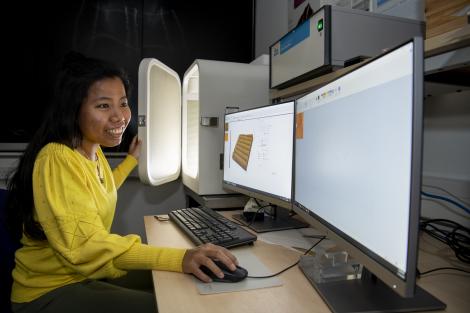An international research collaboration led by the University of Southampton will unlock the potential of innovative smart textiles for use across a range of high growth industries.
The €5.5 million SmartT programme brings together specialists from the UK and France to advance functional inks for new applications in fashion, sport, safety ware, advertising and mapmaking.
The three-year project combines the University of Southampton's expertise in Organic Chemistry and Electronics and Computer Science under the direction of Professor David Harrowven and Professor Steve Beeby.
SmartT aims to make over 100 smart inks that each emit different coloured light following electrical stimulation, creating a colour chart spanning the entire visible spectrum from red to violet, and beyond into the ultraviolet region.
Scientists will also work at the atomic level, aided by high-performance computation, to deliver a drug-free bandage that delivers superbug-killing UV irradiation. The prototype could represent a vital solution to growing the worldwide issue of antimicrobial resistance.
Professor Beeby, Head of the Smart Electronic Materials and Systems (SEMS) group, says: "This collaboration will enable us to develop some unique screen printable inks suitable for use on flexible and textile substrates. It is particularly relevant to our e-textiles research activities and this project will enable results to be rapidly evaluated in real applications."
Southampton's leadership in electronic textiles and energy harvesting was recently recognised in the award of a prestigious Chair in Emerging Technologies from the Royal Academy of Engineering. Professor Beeby is one of just eight UK-based researchers to share funding worth a total of £22 million to support disruptive innovations with the potential to considerably benefit society and the UK economy.
Smart e-textiles are produced by embedding pixels (OLECs) that emit light when stimulated electrically. Each pixel has a sandwich structure comprised of five layers.
The top and bottom layers are colourless polymer coatings designed to protect the functional inner layers from scratching, oxidation by air or leaching/corrosion on washing. The inner layers are composed of positive and negative electrical contacts separated by the functional ink which produces the light when live.
To maximise business opportunities and impact, SmartT has specialists in device fabrication working alongside experts with the skills needed to tune each layer of the pixel for a specified application.
The Interreg grant, which includes €3.7 million from the European Regional Development Fund (ERDF), includes expertise from France's Centre National de la Recherche Scientifique, the University of Rouen, the Institut National des Sciences Appliquées (INSA), L'Institut Français de Recherche pour l'Exploitation de la Mer (IFREMER) and SME SplashMaps Ltd.
Professor Harrowven, Head of Organic Chemistry: Synthesis, Catalysis and Flow, says: "Smart e-textiles are projected to grow from €100 million to €2 billion over the next decade and our goal is to help SMEs realise their potential in this rapidly emerging field through the cooperation of experts on both sides of the Channel.
"SmartT will help develop new products and services, ranging from dynamic fabric mapping products for the tourism and outdoor leisure market to a drug-free anti-infective bandage prototypes and eco-friendly anti-fouling surfaces."
Rebecca Mayrhofer, SmartT Project Manager, says: "Our aim is to bridge the gap between our academic innovators and industry, paving the way for new product developments and applications."
